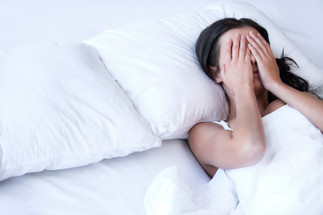Posted by Miriam Akervall on Jun 9th 2016
7 Tips to Reduce Stress for Better Sleep

If reading our last post about bruxism, or night grinding, made you anxious to glean prevention strategies, look no further.
First of all -- stop being anxious! Easier said than done, right?
Bruxism, as we mentioned last time, is a largely anxiety or stress-induced condition. Chronic stress causes muscles to tense up which leads to the upper and lower teeth to clenching together.
In some cases, it occurs naturally, without any underlying cause, but this type of bruxism (referred to as specific bruxism) is less common to recur problematically.
When it comes to bruxism, it can be tricky just figuring out whether or not you have it. People usually don’t find out that they grind their teeth at night until a loved one notices, or after experiencing other symptoms in the morning. Sometimes, the dentist is the first to know.
But however stealthily it may seem to descend, bruxism doesn’t fall out of the sky.
Some studies have found that day-time stress and severe self-reported bruxism are significantly correlated, meaning that the condition could be your body’s response to intense, continuous anxiety.
These sorts of stress-related conditions can feel impossible to remedy. You can’t see stress the way you can see a broken arm, which is why it tends to be ignored. The effects, however, are very real, influencing your ability to focus, your sleep, and as we know, the health of your teeth!
Stress and sleep are linked in a nasty cycle. Enduring a stressful day can severely influence your sleep. At the same time, lack of sleep is one of the leading causes of stress.
Break the cycle and follow these seven easy steps to reduce your stress, get better sleep and help prevent and relieve bruxism.
Put the Phone Away
There’s no doubt that phones and technology have become completely integrated into our daily lives. However, the light emitted from our devices and the mental activity can make it a lot harder to fall asleep. To ensure a good night's rest, turn off all devices with backlit screens at least 30 minutes before going to sleep.
Turn the Lights Off
Keep your room as dark as possible short of boarding up your windows. Invest in light dampening curtains, or even a funky sleep mask like this one… No one has to know.
Keep Your Cool
If your body is physically uncomfortable it become much harder to sleep. 65-72 degrees fahrenheit is the recommended sleeping temperature.
Wind Down
Give yourself time to relax before dozing off. Avoid consuming caffeine or alcohol within five hours of going to bed. Take a bath, strike a yoga pose or two, maybe meditate for a few minutes or put on some soft music to ease out of the day’s events.
Stick to a Routine
We are creatures of habit. Our bodies love routine. Going to bed and getting up at different times everyday can confuse the body’s “biological clock” medically referred to as circadian rhythm. Try to wake up and go to bed around the same time every day, i.e. no binge watching The Office until 2 AM. Do that during the day.
Avoid Naps
If you can resist, wait until you can have a full night’s sleep. Taking naps can reset the body’s adenosine and other neurotransmitters that cause sleepiness, which can cause insomnia later.
Use a Night Guard
To protect your teeth and prevent from the damage of bruxism, it’s a good idea to wear a night guard in case bruxism is slow to subside or returns. If pain worsens and symptoms persist, be sure to talk to your dentist about other solutions.

